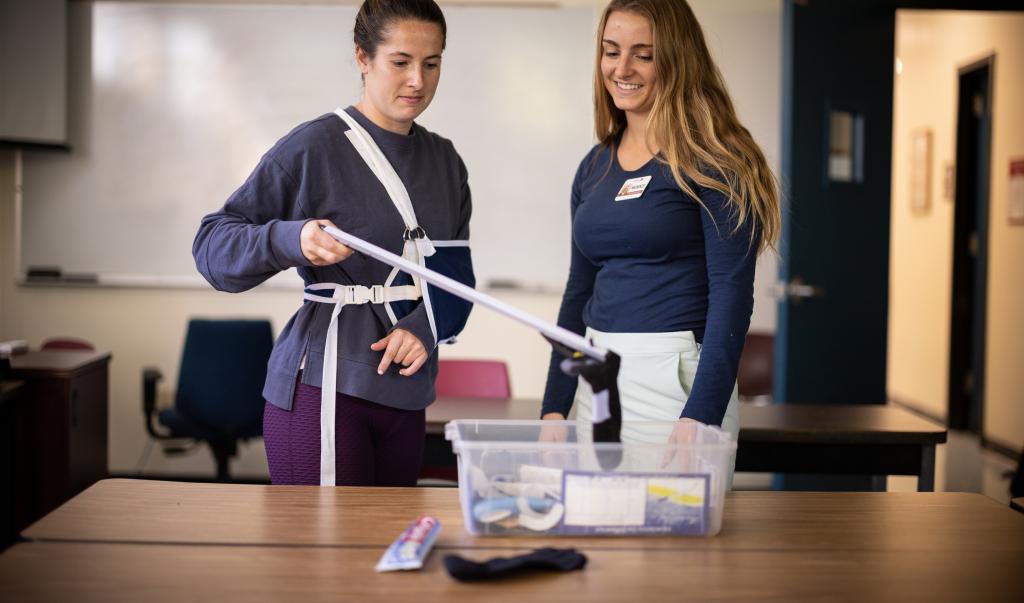Occupational Therapy (MSOT)
| About This Program | |
|---|---|
|
Admissions Contact
Erin Maznicki Are you an International Student? |
|
|
Program Contact
Scott McNeil |
|
Curriculum and Delivery
|
|
Start Dates and Duration
|
|
| Paying for Your Education | |
Program Outcomes
|
|
| Graduate Success and Careers | |
|
Explore our FAQs |
|
|
Considering a Doctorate in Occupational Therapy?
Within the first year of the program, MSOT students may transition to the entry-level Doctor of Occupational Therapy (OTD) at Springfield College pending availability |
|
|
BS to MSOT Option
Are you looking for our undergraduate pre-occupational therapy program? Springfield College also offers a BS in Health Science: Pre-OT to MSOT you can complete in five and a half years. |
|
|
Upcoming Events
Occupational Therapy (Master's and OTD) In-Person Information Session Tips and Pointers for Applying to Graduate School Graduate Spring Open House Financial Aid Information Session |
|
|
Like us on Facebook |
|

Transform Lives Through Rehabilitation.
In the Springfield College MS in Occupational Therapy (MSOT), you’ll engage in a mix of classroom, laboratory, group projects, and fieldwork experiences. As a student, you will become practiced in entry-level occupational therapy theory, evaluation and treatment techniques, clinical reasoning, research, teaching skills, management, and teamwork.
With the opportunity for flexible scheduling, the Occupational Therapy program is ideal for any student. You’ll gain experience working under the direction of trained therapists in two full-time fieldwork rotations. These experiences will help you build essential technical and clinical skills, critical problem-solving techniques, leadership skills, and self-confidence and professional identity. And, with more than 300 affiliated fieldwork sites across the country, you’ll be able to do something you love—all while giving back to your community.
Graduates of the MSOT program will be eligible to take the board exam, become licensed, and work as an occupational therapist.
Employment opportunities for occupational therapists are expected to increase 11% over the next 10 years, faster than the average for all occupations, according to the U.S. Bureau of Labor Statistics.
With a degree in Occupational Therapy, you can have an in-demand and fulfilling career. Our graduates work at schools, universities, government agencies, hospitals, rehabilitation centers, community-based settings, and in many other settings across the country.
How to Apply:
Prerequisite Courses
The prerequisite courses include:
- Anatomy and Physiology, I and II courses with labs (must be taken within the past 5 years) (6-8 credits)
- Natural science course with lab (3 to 4 credits)
- Abnormal Psychology course (3 credits)
- Lifespan Development/Developmental Psychology course (3 credits)
- Statistics (3 credits)
- Sociology or Anthropology course (3 credits)
- English and writing intensive courses (6 credits)
Admission Requirements
1. Complete either of the following:
OR
- Apply using our online application: Once your application form is processed you will receive an email with your application portal login credentials and instructions for submitting supplemental materials as listed below.
2. Essay: In two to three double-spaced pages, please describe significant life experiences that have contributed to your interest in your field, your understanding of this field, your occupational objectives, and why you have chosen Springfield College.
3. Resume: Please include any college activities, out-of-school leadership experiences, work history, and community involvement to support your interest in or qualifications for graduate study.
4. Cover Letter: Please submit a cover letter that describes your specific interest in attending Springfield College and why this program is a good fit for you.
5. Three letters of recommendation: Three letters of recommendation from a faculty member or direct supervisor: Recommenders will receive an email when you submit your application and will be able to upload your letter to your application.
6. Transcripts: An official transcript from each college/university you have attended is required. In order to be considered official, transcripts must be received directly from the original source, by email to graduate@springfield.edu or mailed to the college address:
Springfield College
Office of Graduate Admissions
263 Alden Street
Springfield, MA 01109
International Applicants
- $100 non-refundable International Application fee
In addition to the above admissions requirements, all international applicants from non-English-speaking countries are required to submit:
- Proof of English language proficiency by way of the TOEFL or IELTS: Other tests may be accepted on a case-by-case basis. Please refer to our language requirements for more information on acceptable tests, minimum scores, exemptions, and conditional acceptance. If your undergraduate degree was earned in the United States and you successfully completed college-level English, we will consider English language proficiency met.
- Please note: Transcripts must be in English. If the transcript is not in English you will be required to submit a professional credential evaluation completed by any member of the National Association of Credential Evaluation Services (NACES). For this we recommend SpanTran, with its customized portal for Springfield College applicants. World Education Services or Josef Silny & Associates, Inc. are also recommended for your credential evaluations.
The Office of International Admissions can assist you with questions you may have about enrolling at Springfield College as an international student by emailing intladmissions@springfieldcollege.edu.
Application Deadlines
Domestic Students:
- Applications are reviewed on a rolling basis as space is available.
International Students:
- Application and Supporting Materials Deadline: May 1

